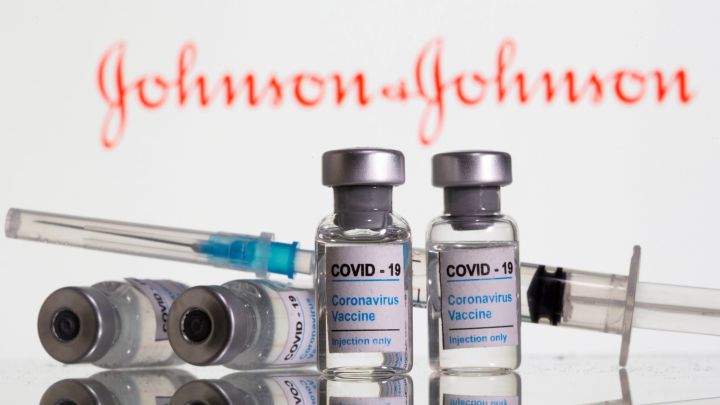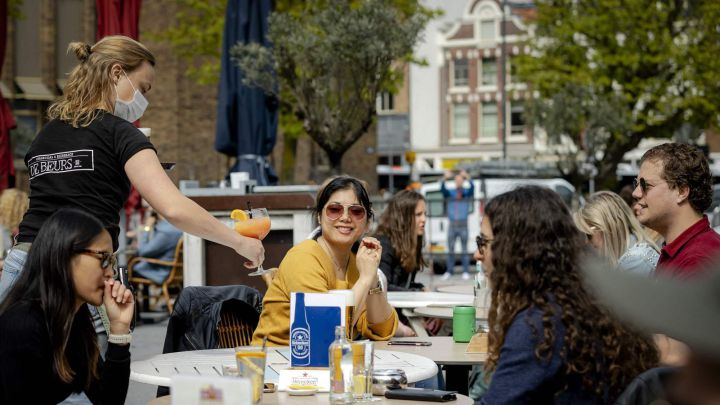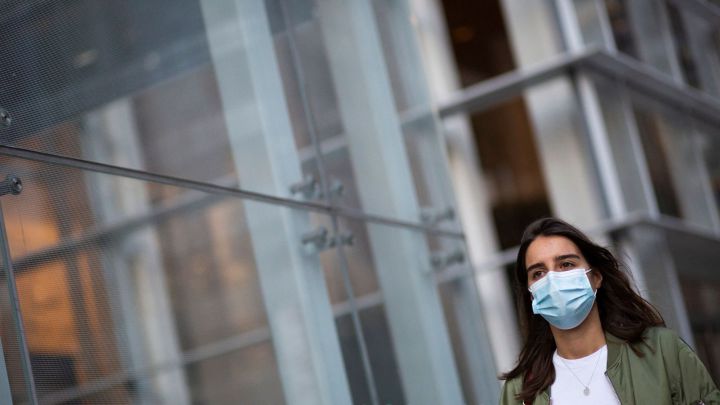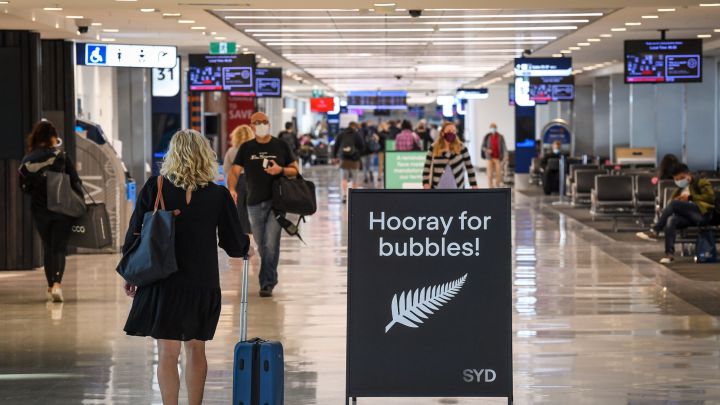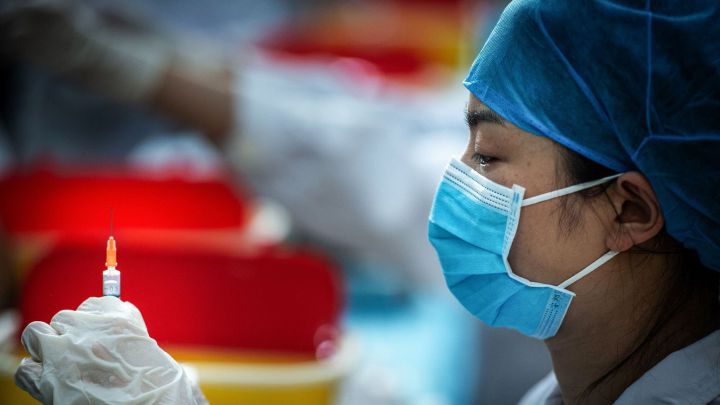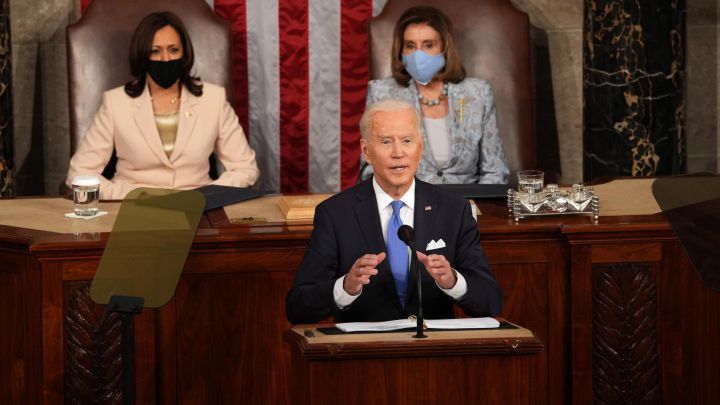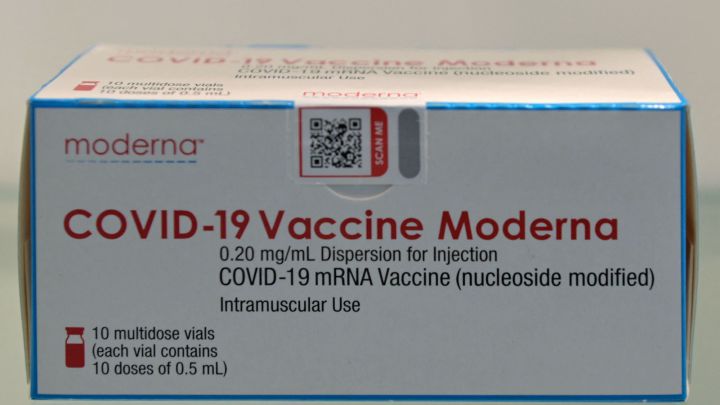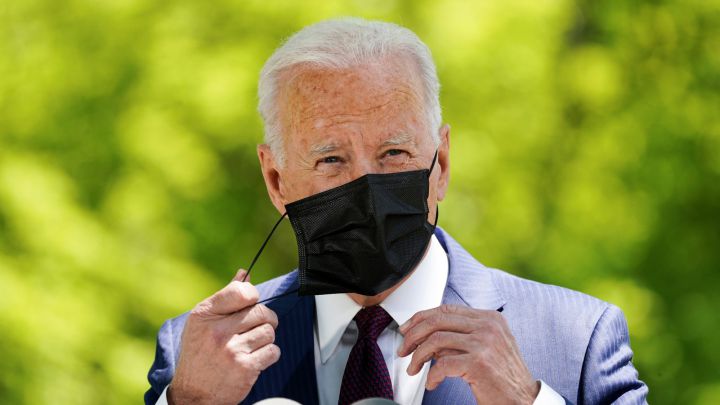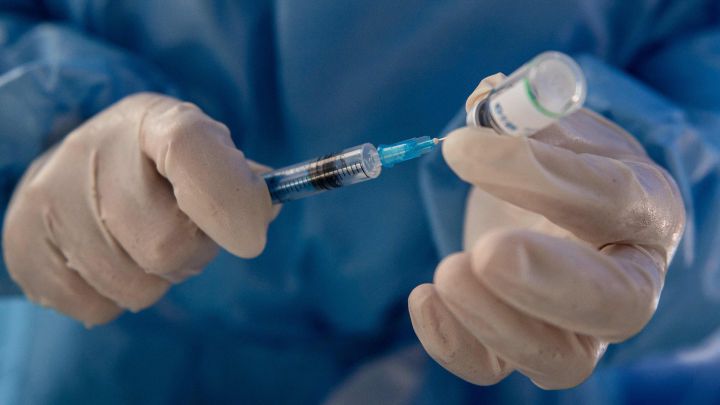Covid-19 vaccine in the US: | news summary for 29 April 2021
Keep up to date with the latest United States vaccine news as all people 16 and older are now eligible for the coronavirus vaccine in every state.

Show key events only
Covid-19 vaccine in the US | Live updates 29 April
Headlines
NEW: Researchers may have uncovered a connection between swollen lymph nodes after vaccination and individuals who had tested positive for covid-19. The study, which is currently undergoing peer review, found that those who had experienced covid-19 were more likely to report that they had swollen lymph nodes after receiving a vaccine. Read more.
-More than five million Americans did not get their second dose of the Moderna or Pfizer vaccines, read more.
-New recommendations from CDC for fully vaccinated individuals, read them here.
-Biden announces that 70% of US residents of 65 are fully vaccinated. Senior deaths from covid are down 80%.
More than five million Americans did not get their second dose of the Moderna or Pfizer vaccines, according to a report released by the Centers for Disease Control and Prevention.
-Covid-19 vaccine passports apps: which ones can be used in the US? Learn more
-Side effects: How long do they last? What causes them?
-Latest on Johnson and Johnson Vaccine: is it available in the US?
- US covid-19: 32.26 million cases / 574,767 deaths (live updates from Johns Hopkins University)
Scroll through some of our related articles:
Pfizer begins exporting U.S. made COVID-19 shots abroad, starting with Mexico
Pfizer Inc's shipment of COVID-19 vaccine to Mexico this week includes doses made in its U.S. plant, the first of what are expected to be ongoing exports of its shots from the United States, a source familiar with the matter told Reuters on Thursday.
The vaccine shipment, produced at Pfizer's Kalamazoo, Michigan plant, marks the first time the drugmaker has delivered abroad from U.S facilities after a Trump-era restriction on dose exports expired at the end of March, the source said.
The U.S. government has been under mounting pressure in recent weeks to provide surplus vaccines to other nations desperately in need as it makes swift progress vaccinating its own residents. Many countries where the virus is still rampant are struggling to acquire vaccine supplies to help tame the pandemic.
Pfizer has shipped more than 10 million doses to Mexico so far, becoming its largest supplier of COVID-19 vaccine. Mexico’s health ministry said it is receiving 2 million doses from Pfizer this week. It was unclear how many of those will come from the United States. Pfizer produces its COVID-19 vaccine in partnership with German biotech BioNTech SE. (Reuters)

In pictures: Prisoners at the Bolivar County Correctional Facility fill out paperwork as they receive a Covid-19 vaccination administered by medical workers with Delta Health Center on April 28, 2021 in Cleveland, Mississippi.
The prisoners, part of a population particularly vulnerable to Covid-19, are given a choice between the one-shot Johnson & Johnson vaccine and the Moderna. So far, an estimated 23 percent of Mississippians are fully vaccinated, and the Mississippi State Department of Health has reported a total of 334 new cases as of April 27. (Photo: AFP)
CDC projects up to 595,000 US Covid-19 deaths will have been reported by May 22
An ensemble forecast published Wednesday by the US Centers for Disease Control and Prevention now projects that there will be 583,000 to 595,000 coronavirus deaths reported by May 22. The US has so far reported 574.978 Covid-19-related deaths, according to John Hopkins University figures.
Which states have lifted mask mandates?
Some lawmakers have opted to lift mask mandates even as covid-19 cases and hospitalizations rise in their states.
30% of US population now fully vaccinated
According to the Centers for Disease Control and Prevention’s latest figures, 43.3% of the US population have now received at least one dose of a covid-19 vaccine, and 30% have now been fully vaccinated.
In total, 99,688,445 people in the US have been fully vaccinated.

Moderna expects increase in global vaccine production
In this file photo taken on 16 February 2021, medical worker Robert Gilbertson loads a syringe with the Moderna covid-19 vaccine to be administered by nurses at a vaccination site at Kedren Community Health Center, in South Central Los Angeles, California.
US pharmaceutical firm Moderna said on Thursday that it expects to increase global production of its covid-19 vaccine to up to three billion doses in 2022. The company said in a statement that it would make new funding commitments to increase supply at its manufacturing facilities.
(Photo: Apu GOMES / AFP)
Covid-19 vaccine passports apps: which ones can be used in the US?
Two states in the US have authorized a covid-19 passport for use while several states have banned the concept. The White House will not make it mandatory.
With demand for vaccines declining in some states, public health officials like Dr. Anthony Fauci are counting on athletes and other public figures to encourage those who follow them to get vaccinated. Some NBA teams have also worked with state and local governments to use their arenas as vaccine distribution centers.
On 28 April, NBA commissioner Adam Silver, told "Time" that 70% of players had been given at least one shot.
Good news for senior citizens in the US
On 28 April, the CDC released the results of an assessment which found that fully vaccinated seniors are 94% less likely to need to be hospitalized with a severe case of covid-19. The research team looked examined hospitalization rates of seniors who had received either Pfizer or Moderna's vaccine.
Read more on the report here.
The United States begins preparations to send "critical oxygen equipment, therapeutics and raw materials for vaccine production" to India. India is currently seeing a large increase in covid-19 infections.
In the last seven days, the country has broken case records and reported an average of more than 350,000 infections each day. With the second-largest population in the world and only about two percent vaccinated, dramatic actions will need to be taken to lower the spread of the virus.
India's leader, Narendra Modi, has spoken with various world leaders over the last week hoping to raise the profile of the issue his country is facing and see if other countries are able to lend support. Russia, the United States, China, and various EU members have pledged their support. India has largely ignored offers from Pakistan to overcome the challenges.
What do swollen lymph nodes after a covid-19 vaccine indicate?
New study sheds light on why some people may experience more severe vaccine side effects
MedRxiv, a consortium made up Cold Springs Harbor Laboratory, BJM, and Yale University, released preliminary findings from a study this week that showed people who had experienced covid-19, were more likely to report swollen lymph nodes and other side effects after vaccination.
Lymph nodes form part of a body’s immune system and help to filter liquids used to fight infection. Humans have hundreds of these nodes scattered around the body. When the immune response kicks in, the nodes swell to limit the passage of the viruses and bacteria throughout the rest of the body.
After some patients received a covid-19 vaccine, they reported that their lymph nodes were swollen and sore. While uncomfortable, this side effect is a sign that the body’s immune response was engaged. The researchers found that there was a statistically significant difference in the rate that those who had been infected with covid-19 reported experiencing more moderate or severe side effects after vaccination.
The study will undergo peer review and as more scientists review the data, more insights may be gained into this possible connection.
How are swollen lymph nodes related to covid-19 vaccination?
Researchers may have uncovered a connection between swollen lymph nodes after vaccination and individuals who had tested positive for covid-19. The study, which is currently undergoing peer review, found that those who had experienced covid-19 were more likely to report that they had swollen lymph nodes after receiving a vaccine.
Biden Joint Session speech to Congress summary: covid, American jobs
What did Biden say about vaccine distribution during his joint address to Congress?
Reaching his administration's goals
We're already seeing the results. After I promised we'd get 100 million COVID-19 vaccine shots into people's arms in 100 days, we will have provided over 220 million COVID shots in those 100 days. Thanks to all the help of all of you. We're marshaling, with your help, everyone's help, we're marshaling every federal resource.
Logistical achievements
We have gotten vaccines to nearly 40,000 pharmacies and over 700 community health centers where the poorest of the poor can be reached. We're setting up community vaccination sites, developing mobile units to get to hard-to-reach communities. Today, 90% of Americans now live within five miles of a vaccination site.
On supporting global distribution
There’s no wall high enough to keep any virus away. As our own vaccine supply grows to meet our needs -- and we are meeting them -- we will become an arsenal of vaccines for other countries -- just as America was the arsenal of democracy in World War II.
For a full summary of the speech, read more here.

As vaccine rollout continues, disparities between rich and poor countries are being brought to light. To date, eighty-seven percent of vaccines have been administered in high-income countries like the United States and European Union member states.
An article recently published outlines the threat that low vaccination rates in “less developed countries” may have on reaching global herd immunity. The authors warn that with the current vaccination rate of “roughly 6.7 million doses per day”, herd immunity at the global level could be delayed 4.6 years.
While “vaccine nationalism” is partly to blame, the experts also say that inequities in distribution “reveal a fundamentally flawed view of global health, and our global economy more broadly, in which vaccines and essential medications are treated as a market commodity rather than as a public good.”
Experts warn that inequal distribution could lead to the need for a third vaccine. Read more to find out why.
What happens if you do not get a second covid-19 vaccine dose?
Experts estimate that there are about five million people in the US who have gotten one vaccine dose and forgone or postponed their second. Public health experts are scrambling to identify these individuals and ensure that they get their second shot.
Preliminary findings from a few studies currently undergoing peer review show that with Pfizer’s vaccine, a robust immune response is possible after the first dose. While this is positive news, the length of time your body will be able to create that response is unknown. For this reason, and others, public health experts are in agreement that the second dose is necessary to maximize protection.
Why are people skipping their second dose?
There has been widespread reporting that the second dose tends to cause greater side effects which may have increased hesitancy. While feeling side effects may increase reluctance in getting a second dose, the CDC has released guidance saying that the symptoms should only last a few days. On the other hand, a severe case of covid-19 can lead to hospitalization, long-term health impacts such as organ damage or memory loss, and even death.

Which states have the highest and lowest percentage of vaccinations and why?
Many rural states fell behind in vaccinations during the pause of the Johnson & Johnson (J&J) single-dose vaccine. The J&J vaccine is much easier to manage on a logistical scale as it does not need to be kept at the same freezing temperatures as the vaccines created by Pfizer and Moderna. States with the lowest percentage of fully vaccinated residents include Alabama, Georgia, Mississippi, Utah, Arkansas, and Indiana.
Now that the pause has ended we may see the percentages of fully vaccinated individuals in these states begin to rise more quickly.
After a quick pause, the Johnson and Johnson vaccine is available in the United States.
After the pause by the CDC and a few manufacturing disruptions, Johnson and Johnson is looking to rapidly scale up the distribution of their vaccine. To speed up the production Johnson & Johnson have licensed around ten other companies to make the one-shot vaccine in their own facilities.
For more on the continued rollout of the vaccine, read here.

Senior citizens can breathe a little easier
As more and more seniors receive their second doses, life is very different than it was a year ago. Grandparents are able to hug their grandchildren, some for the first time.
According to the CDC, nearly 70% of all US residents over 65 are fully vaccinated. In President Biden’s first joint address to Congress, he informed the country that senior covid deaths are down 80% compared to early January of this year.
More than 95% of those killed by covid-19 in the United States were over the age of fifty. Ensuring that this population is protected is a major step in returning to normal.
With 88% of its senior citizens fully vaccinated, Vermont leads the country in terms of percent of seniors fully vaccinated. Utah ranks last with just over 55% of seniors fully vaccinated.

People at Increased Risk to covid-19: Incarcerated Individuals
Roughly 30 percent of prisoners in federal facilities have been infected with covid-19 and 233 have died as a result. Prisoners and incarcerated people more broadly face a higher risk of ineffective to covid-19 and throughout the pandemic, many virus hotspots have been traced make to detention facilities.
Vaccines have been offered to all staff in federal prisons and to date a little under half are fully vaccinated. If there are leftover doses from staff, they are distributed to residents based on their age, health status, and other factors. However, the CDC has released guidance that encourages staff and inmate vaccination to occur simultaneously and that doses are prioritized for groups with higher risk of severe infection of covid-19.
Read on for more information on how the CDC advises states to vaccinate their incarcerated populations.
When I was sworn in on Jan. 20, less than 1% of the seniors in America were fully vaccinated against COVID-19. One hundred days later, 70% of seniors in America over 65 are protected, fully protected. Senior deaths from COVID-19 are down 80% since January, down 80% because of all of you.

Nationally, about thirty percent of US residents are fully vaccinated. The states leading the vaccination charge as a percent of their population are Maine, Connecticut, New Mexico, Vermont, Massachusetts, Rhode Island, and South Dakota. The overall populations of these states are smaller, meaning that the authorities may be able to move through the vaccination process more quickly. President Biden has stated that he hopes to see the country back to some semblance of normalcy by the Fourth of July. On 1 May, the nation will get one step closer to that goal as all residents over the age of 16 will be eligible to receive a covid-19 vaccine for free. Looking to book a vaccine appointment? Use the CDC's Vaccine Finder tool.
How long do covid-19 vaccine side effects last?
The CDC has issued guidance on potential side effects for coronavirus shots. The symptoms are fairly rare but you may need to contact a doctor if they persist.
The national vaccination effort has been one of President Joe Biden’s top priorities since taking office in January. His American Rescue Plan provided hundreds of billions of dollars to aid the vaccine rollout and the shots are now available to all adults.
Biden initially set the target of 100 million shots in his first 100 days, but last weeks it was announced that his administration had reached 200 million within the first 100 days.
Life-saving vaccinations are the best route out of the pandemic, but they do come with some fairly common side effects.

Dr. Fauci on Joe Rogan’s ‘incorrect’ vaccine comments: Why young people should ‘absolutely’ get vaccinated
CNBC - Popular podcast host and comedian Joe Rogan recently said he believes healthy young people don’t “need to worry” about getting vaccinated for Covid.
But Dr. Anthony Fauci, White House chief medical advisor and the nation’s leading expert on infectious disease, says that guidance is “incorrect.” Young healthy people should “absolutely” get vaccinated, Fauci said during an interview with NBC News’ TODAY on Wednesday.
On an episode of the podcast “The Joe Rogan Experience” published April 23, Rogan said he supported vulnerable people getting vaccinated. “But if you’re like 21 years old, and you say to me, should I get vaccinated? I’ll go no,” Rogan told comedian Dave Smith on the podcast.
CDC relaxes the use of face masks for fully vaccinated
After the CDC released its new guidance on Tuesday President Biden addressed reporters outside the White House saying “Beginning today, gathering with a group of friends, in a park, going for a picnic. As long as you are vaccinated and outdoors, you can do it without wearing a mask.” He added “The bottom line is clear. If you are vaccinated you can do more things, more safely both outdoors as well as indoors.”
For the unvaccinated there was good news, they too no longer need to wear a mask to go hiking, cycling or running alone or with a household member. However, the CDC is still advocating that they should wear masks at outdoor gatherings that include other unvaccinated people not part of their household. They also should keep using masks at outdoor restaurants whereas the fully vaccinated can go maskless.
Coronavirus US: is it necessary to wear mask after the vaccine according to Biden?
Good news for the almost 29% of the US population that is now fully vaccinated - masks are no longer necessary outdoors. But for others restrictions still apply.

US Marines get vaccine in Japan
A United States Marine receives the Moderna coronavirus vaccine at Camp Foster in Kin, Japan, on Wednesday.
A US military vaccination program aiming to inoculate all service personnel and their families against covid-19 is underway on Japan's southernmost island of Okinawa, home to around 30,000 American troops and one of the largest US Marine contingents outside of mainland USA.
(Photo: Carl Court/Getty Images)
CDC study: Pfizer, Moderna vaccines reduce hospitalization risk by 94% among adults aged 65 and over
Real-world data compiled in a Centers for Disease Control and Prevention (CDC) study has shown that the Pfizer and Moderna coronavirus vaccines have reduced the risk of hospitalization by 94% among fully vaccinated people aged 65 or over in the United States.
The research also found that the vaccines are 64% effective among those aged 65 and above in the US who have been partially vaccinated.
“These data suggest that continuing to rapidly vaccinate U.S. adults against COVID-19 will likely have a marked impact on COVID-19 hospitalization and might lead to commensurate reductions in post-COVID conditions and deaths,” the researchers said in their report.
What can I do after I am fully vaccinated?
Roughly 30 percent of the US population has been vaccinated. With vaccination levels inching closer to herd immunity, the Centers for Disease Control and Prevention (CDC) has released interim guidance on what is safe for fully vaccinated people to do.
29.5% of US population now fully vaccinated
The Centers for Disease Control and Prevention has updated its vaccine data, revealing that 43% of the US population have now received at least one dose of a coronavirus vaccine, and that 29.5% have now been fully vaccinated.
In total, 98,044,421 people in the US have been fully vaccinated against covid-19.
Why are there side effects to covid-19 vaccines?
Vaccines train your immune systems to recognize a pathogen and prevent infection. When being vaccinated, you may find that you suffer from side effects ranging from fever to headache. This is good news and means the vaccine is working.
In the case of the covid-19 vaccines, your body is receiving pieces of the virus’s genetic code so that in the case you are infected, your immune system can quickly begin to create antibodies.
In the US, three pharmaceutical companies -- Pfizer, Moderna, and Johnson and Johnson -- have had their vaccines approved. These vaccines have demonstrated high efficacy in preventing covid-19 infection but after the poke some patients have reported feeling side effects, which are in almost all cases mild.
Covid-19 vaccine news: welcome
Hello and welcome to our dedicated live blog for Thursday 29 April 2021.
Here we aim to keep you fully up to date with all the latest news and updates regarding the covid-19 pandemic and all aspects of the vaccine development and rollout across the United States.
